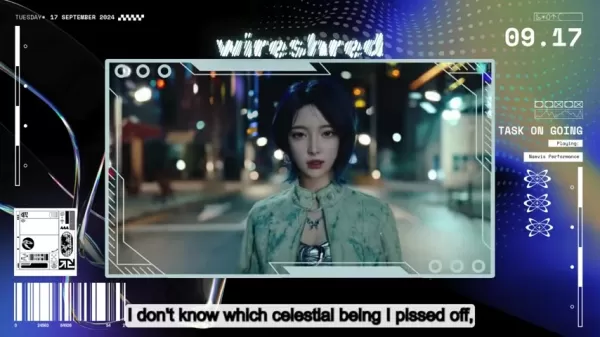Naevis's K-Pop Breakthrough: Exploring AI Idols and Entertainment Ethics
K-Pop continues to innovate, blending music, performance, and cutting-edge technology. The rise of AI idols—virtual performers free from human constraints—has sparked widespread discussion. Naevis, a trailblazing virtual artist, has ignited both enthusiasm and controversy with her debut. This article explores Naevis’s impact, the distinction between AI and virtual idols, and the ethical challenges of this new entertainment frontier. Is this a bold leap forward or a strategic marketing move?
Key Highlights
Understanding the difference between AI idols and virtual idols is vital to navigating K-Pop’s evolving landscape.
Naevis’s debut underscores the fusion of human artistry with advanced AI technology.
Ethical questions about AI-generated content and its impact on human artists are critical.
Entertainment companies may favor AI idols for cost savings over authentic creativity.
The use of CGI and motion capture in virtual performances raises authenticity concerns.
Evaluating the financial benefits versus artistic trade-offs of virtual versus human artists is essential.
The Rise of AI Idols in K-Pop
What is the Naevis Phenomenon?
Naevis’s recent debut has thrust AI idols into the spotlight of K-Pop discourse. Unlike traditional groups with human performers, Naevis is a virtual creation, prompting questions about the industry’s future.

Is Naevis a true AI or an advanced virtual construct? Clarifying this distinction is key to understanding tech-driven entertainment. Her creators at SM Entertainment, in collaboration with LG Uplus, claim Naevis is AI-driven, with a voice synthesized from 12 actresses and capable of independent interaction. But is this genuine AI or clever branding?
AI Idols vs. Virtual Idols: A Key Distinction
The terms AI idols and virtual idols are often confused, but their differences are significant and worth unpacking.
- Virtual idols, like PLAVE, rely on human performers using motion capture to animate avatars. Real artists control their movements and voices, using the avatar as a creative medium.
- AI idols, in theory, are fully autonomous, capable of singing, dancing, and engaging fans without human input. However, current technology limits true AI idols, with projects like Naevis relying on AI-generated elements, such as music videos and visuals, created with LG Uplus’s generative AI.

This distinction matters because the ethical implications hinge on the degree of human involvement. Where do we draw the line with AI? Can someone’s voice or likeness be used without consent?
Grasping this difference is crucial to engaging with the ongoing debate.
Ethical Challenges in AI-Driven Entertainment
Ethical Concerns Surrounding AI Idols
The growing role of AI in entertainment raises serious ethical questions, particularly about displacing human talent. Could AI idols reduce opportunities for singers, dancers, and performers? Some fear that machines’ precision could diminish the demand for human artists.

Critics argue this trend could replace dedicated professionals with subpar, automated content.
Another concern is the potential misuse of AI-generated content. When AI mimics an artist’s style, questions of ownership, consent, and control over one’s image arise. Should artists be compensated for their likeness being sampled? These issues demand scrutiny in a rapidly evolving industry.
Ethical objections to generative AI are widespread and growing.
Financial Drivers Behind AI Idols
The financial incentives for adopting AI idols are clear. Virtual artists are low-maintenance, requiring no human management or union negotiations, potentially cutting costs for entertainment companies.
However, this reliance on technology may compromise artistic authenticity. Fans connect deeply with human artists’ personal stories and emotions. Can AI-generated content replicate this bond, or will it leave audiences feeling disconnected?
In chasing profits, companies risk prioritizing cost-cutting over genuine artistry. Will financial motives overshadow creative integrity?
Public Sentiment on Generative AI
Many oppose generative AI for ethical reasons, viewing it as a shortcut that undermines human labor.

Critics argue it replaces skilled workers with low-quality output, prioritizing cost savings over artistic value. Companies may favor CGI over human talent to generate buzz while minimizing expenses, but this approach risks devaluing the labor behind true creativity.
The tension lies in balancing technological innovation with respect for human artistry.
How Motion Capture Works: A Step-by-Step Guide
Step 1: Suit Up
The performer wears a motion capture suit equipped with sensors and markers at key joints, tracked by cameras to capture movement.
Step 2: Calibration
The performer calibrates their movements within the motion capture system’s range. Cameras map the markers to create a 3D model of the actions.
Step 3: Recording Motion
The performer’s actions are recorded in real-time, with the data used to animate the virtual artist on screen.
Virtual Idols vs. Human Idols: A Comparison
Pros
Content creation is flexible and ongoing.
Virtual idols are ageless and enduring.
They require minimal management effort.
Cons
Forming personal connections with fans is challenging.
Upfront costs can be significant.
Creative expression is often limited.
Frequently Asked Questions
What’s the Difference Between AI and Virtual Idols?
AI idols operate autonomously without human performers, while virtual idols rely on real artists controlling avatars.
Would You Choose to Be an AI or Virtual Idol?
Ethical concerns lead most to prefer virtual idols, which allow for creative expression by human artists.
Related Questions
What Are the Benefits of Developing AI?
AI can streamline processes, enhance scalability, and expand reach. It often outperforms humans in efficiency and learning speed. As technology evolves, questions of responsibility will grow, reshaping the entertainment landscape.
Related article
 Google's AI Notebooks Guide You Through Topics Like Parenting and Shakespeare
Google is collaborating with thought leaders and publishers to introduce curated "featured" notebooks in its AI-powered NotebookLM platform. These preloaded digital companions contain authoritative research materials and enable interactive exploratio
Google's AI Notebooks Guide You Through Topics Like Parenting and Shakespeare
Google is collaborating with thought leaders and publishers to introduce curated "featured" notebooks in its AI-powered NotebookLM platform. These preloaded digital companions contain authoritative research materials and enable interactive exploratio
 Sam Altman Launches Startup Aiming to Merge AI with Human Intelligence
The tech rivalry between Elon Musk and Sam Altman appears poised to expand beyond artificial intelligence into the emerging field of neural technology. Fresh reports indicate OpenAI's leadership is entering the brain-computer interface space, setting
Sam Altman Launches Startup Aiming to Merge AI with Human Intelligence
The tech rivalry between Elon Musk and Sam Altman appears poised to expand beyond artificial intelligence into the emerging field of neural technology. Fresh reports indicate OpenAI's leadership is entering the brain-computer interface space, setting
 GetGenie AI Enhances Blog Management with Gutenberg Integration
In the competitive digital content arena, efficiency in content creation has never been more crucial. GetGenie AI emerges as a transformative WordPress plugin that seamlessly integrates with Gutenberg, revolutionizing how bloggers and marketers appro
Comments (1)
0/200
GetGenie AI Enhances Blog Management with Gutenberg Integration
In the competitive digital content arena, efficiency in content creation has never been more crucial. GetGenie AI emerges as a transformative WordPress plugin that seamlessly integrates with Gutenberg, revolutionizing how bloggers and marketers appro
Comments (1)
0/200
![EricRoberts]() EricRoberts
EricRoberts
 August 25, 2025 at 3:01:23 PM EDT
August 25, 2025 at 3:01:23 PM EDT
AI 아이돌이라니, 진짜 신기하다! 나에비스 춤이랑 노래 완전 자연스러워서 깜짝 놀랐음. 근데 인간 아이돌이랑 경쟁 괜찮을까? 윤리적으로도 좀 생각해봐야 할 듯... 😮


 0
0
K-Pop continues to innovate, blending music, performance, and cutting-edge technology. The rise of AI idols—virtual performers free from human constraints—has sparked widespread discussion. Naevis, a trailblazing virtual artist, has ignited both enthusiasm and controversy with her debut. This article explores Naevis’s impact, the distinction between AI and virtual idols, and the ethical challenges of this new entertainment frontier. Is this a bold leap forward or a strategic marketing move?
Key Highlights
Understanding the difference between AI idols and virtual idols is vital to navigating K-Pop’s evolving landscape.
Naevis’s debut underscores the fusion of human artistry with advanced AI technology.
Ethical questions about AI-generated content and its impact on human artists are critical.
Entertainment companies may favor AI idols for cost savings over authentic creativity.
The use of CGI and motion capture in virtual performances raises authenticity concerns.
Evaluating the financial benefits versus artistic trade-offs of virtual versus human artists is essential.
The Rise of AI Idols in K-Pop
What is the Naevis Phenomenon?
Naevis’s recent debut has thrust AI idols into the spotlight of K-Pop discourse. Unlike traditional groups with human performers, Naevis is a virtual creation, prompting questions about the industry’s future.

Is Naevis a true AI or an advanced virtual construct? Clarifying this distinction is key to understanding tech-driven entertainment. Her creators at SM Entertainment, in collaboration with LG Uplus, claim Naevis is AI-driven, with a voice synthesized from 12 actresses and capable of independent interaction. But is this genuine AI or clever branding?
AI Idols vs. Virtual Idols: A Key Distinction
The terms AI idols and virtual idols are often confused, but their differences are significant and worth unpacking.
- Virtual idols, like PLAVE, rely on human performers using motion capture to animate avatars. Real artists control their movements and voices, using the avatar as a creative medium.
- AI idols, in theory, are fully autonomous, capable of singing, dancing, and engaging fans without human input. However, current technology limits true AI idols, with projects like Naevis relying on AI-generated elements, such as music videos and visuals, created with LG Uplus’s generative AI.

This distinction matters because the ethical implications hinge on the degree of human involvement. Where do we draw the line with AI? Can someone’s voice or likeness be used without consent?
Grasping this difference is crucial to engaging with the ongoing debate.
Ethical Challenges in AI-Driven Entertainment
Ethical Concerns Surrounding AI Idols
The growing role of AI in entertainment raises serious ethical questions, particularly about displacing human talent. Could AI idols reduce opportunities for singers, dancers, and performers? Some fear that machines’ precision could diminish the demand for human artists.

Critics argue this trend could replace dedicated professionals with subpar, automated content.
Another concern is the potential misuse of AI-generated content. When AI mimics an artist’s style, questions of ownership, consent, and control over one’s image arise. Should artists be compensated for their likeness being sampled? These issues demand scrutiny in a rapidly evolving industry.
Ethical objections to generative AI are widespread and growing.
Financial Drivers Behind AI Idols
The financial incentives for adopting AI idols are clear. Virtual artists are low-maintenance, requiring no human management or union negotiations, potentially cutting costs for entertainment companies.
However, this reliance on technology may compromise artistic authenticity. Fans connect deeply with human artists’ personal stories and emotions. Can AI-generated content replicate this bond, or will it leave audiences feeling disconnected?
In chasing profits, companies risk prioritizing cost-cutting over genuine artistry. Will financial motives overshadow creative integrity?
Public Sentiment on Generative AI
Many oppose generative AI for ethical reasons, viewing it as a shortcut that undermines human labor.

Critics argue it replaces skilled workers with low-quality output, prioritizing cost savings over artistic value. Companies may favor CGI over human talent to generate buzz while minimizing expenses, but this approach risks devaluing the labor behind true creativity.
The tension lies in balancing technological innovation with respect for human artistry.
How Motion Capture Works: A Step-by-Step Guide
Step 1: Suit Up
The performer wears a motion capture suit equipped with sensors and markers at key joints, tracked by cameras to capture movement.
Step 2: Calibration
The performer calibrates their movements within the motion capture system’s range. Cameras map the markers to create a 3D model of the actions.
Step 3: Recording Motion
The performer’s actions are recorded in real-time, with the data used to animate the virtual artist on screen.
Virtual Idols vs. Human Idols: A Comparison
Pros
Content creation is flexible and ongoing.
Virtual idols are ageless and enduring.
They require minimal management effort.
Cons
Forming personal connections with fans is challenging.
Upfront costs can be significant.
Creative expression is often limited.
Frequently Asked Questions
What’s the Difference Between AI and Virtual Idols?
AI idols operate autonomously without human performers, while virtual idols rely on real artists controlling avatars.
Would You Choose to Be an AI or Virtual Idol?
Ethical concerns lead most to prefer virtual idols, which allow for creative expression by human artists.
Related Questions
What Are the Benefits of Developing AI?
AI can streamline processes, enhance scalability, and expand reach. It often outperforms humans in efficiency and learning speed. As technology evolves, questions of responsibility will grow, reshaping the entertainment landscape.
 Sam Altman Launches Startup Aiming to Merge AI with Human Intelligence
The tech rivalry between Elon Musk and Sam Altman appears poised to expand beyond artificial intelligence into the emerging field of neural technology. Fresh reports indicate OpenAI's leadership is entering the brain-computer interface space, setting
Sam Altman Launches Startup Aiming to Merge AI with Human Intelligence
The tech rivalry between Elon Musk and Sam Altman appears poised to expand beyond artificial intelligence into the emerging field of neural technology. Fresh reports indicate OpenAI's leadership is entering the brain-computer interface space, setting
 GetGenie AI Enhances Blog Management with Gutenberg Integration
In the competitive digital content arena, efficiency in content creation has never been more crucial. GetGenie AI emerges as a transformative WordPress plugin that seamlessly integrates with Gutenberg, revolutionizing how bloggers and marketers appro
GetGenie AI Enhances Blog Management with Gutenberg Integration
In the competitive digital content arena, efficiency in content creation has never been more crucial. GetGenie AI emerges as a transformative WordPress plugin that seamlessly integrates with Gutenberg, revolutionizing how bloggers and marketers appro
 August 25, 2025 at 3:01:23 PM EDT
August 25, 2025 at 3:01:23 PM EDT
AI 아이돌이라니, 진짜 신기하다! 나에비스 춤이랑 노래 완전 자연스러워서 깜짝 놀랐음. 근데 인간 아이돌이랑 경쟁 괜찮을까? 윤리적으로도 좀 생각해봐야 할 듯... 😮


 0
0





























